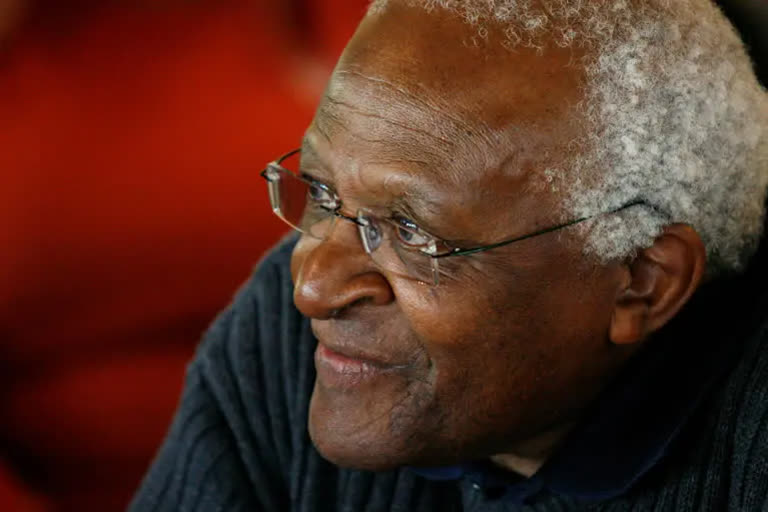Johannesburg: Archbishop Emeritus Desmond Mpilo Tutu's commitment to social justice was such that he took up the cudgels on behalf of millions of people across the world, President Cyril Ramaphosa said on Saturday, describing the esteemed late churchman as one of the rarest souls to attain the stature of a global icon.
President Cyril Ramaphosa made the moving remarks while delivering the eulogy at the funeral of Anglican Archbishop Tutu in Cape Town.
Archbishop Tutu, who was a globally venerated theologian, anti-apartheid campaigner and Nobel Peace Prize laureate, passed away at the age of 90 on Sunday.
In his remarks, President Ramaphosa said that Tutu embraced a wide range of causes in his lifetime in his quest to ensure equality for all.
“He embraced all who had ever felt the cold wind of exclusion and they in turn also embraced him,” Ramaphosa said, highlighting the diverse causes that Tutu had supported, from freedom for Palestinians and the rights of the LGBT+ community to travelling to villages in India and other countries to speak out against forced child marriages.
Recalling Tutu's words, Ramaphosa said that the late Archbishop had said that he would oppose these issues with the same passion that he had opposed apartheid. “Such was his stamina; such was his commitment to social justice for all that he took up the cudgels on behalf of millions of people around the world,” Ramaphosa said.
“There are only a few amongst us – the rarest of souls – who attain the stature of global icon during their lifetime,” Ramaphosa said.
Noting that in modern age, the term global icon has come to be associated with celebrity and social media fame, the president said that if "we are to understand a global icon to be someone of great moral stature; of exceptional qualities; and of service to humanity; there can be no doubt that it refers to the man we are laying to rest today."
President Ramaphosa described Tutu as a crusader for freedom, for justice, for equality and for peace, not only in South Africa – the country of his birth – but around the world as well. He spoke for the oppressed, the downtrodden, and the suffering of the world.
“He was not content to decry apartheid at conferences or benefit concerts or international fora. He was there with the freedom fighters confronting the apartheid regime and comforting its victims.
“He was not content to preach about social justice from the pulpit. He was with the homeless, the helpless, the persecuted, the sick and the destitute, in the streets and in the shelters and in homes," Ramaphosa said.
Conceding that Tutu's death has come at a difficult time in South Africa's history, Ramaphosa said that while there were times when Tutu felt down about the poverty and inequality, he never lost hope.
“Even after the advent of democracy, he did not hesitate to comment, often harshly, on our shortcomings as leaders of a democratic state," he said.
Although Ramaphosa did not refer to it, Tutu had berated the role of former President Jacob Zuma in bringing the African National Congress (ANC) into disrepute, even at one point saying that the day would come when citizens would be praying for the downfall of the ANC that Tutu had supported all his life.
Ramaphosa said that by creating the term 'the rainbow nation', Tutu had given the greatest hope to all in South Africa for a better future through forgiveness after the end of apartheid through his chairmanship of the Truth and Reconciliation Commission.
“While Madiba (clan name by which Nelson Mandela is fondly known) was the father of our democracy, Archbishop Desmond Tutu was the spiritual father of our new nation,” he said.
Ramaphosa said Tutu was the first person to have been granted a Special Official Funeral with religious characteristics.
The distinguishing features of such a funeral include a number of ceremonial elements by the South African National Defence Force (SANDF), but in Tutu's case, based on the late Archbishop's wishes, the SANDF ceremonial content was limited to the handing over of the National Flag to his widow Leah Tutu.
Tutu had requested that his funeral be conducted as simply as possible.
Only a few carnation flowers from the family were allowed into the St Georges Cathedral where he served for a long time. His remains were carried into the church by Tutu's grandchildren in a simple wooden coffin.
Tutu's remains will undergo an aquamation in a private ceremony, after which his ashes will be interred in the cathedral.
Aquamation, which is a more environmentally friendly procedure than cremation, is in line with Tutu's principles of reducing pollution.
PTI
Also Read: PM Modi, Rahul Gandhi condole death of anti-apartheid icon Desmond Tutu



